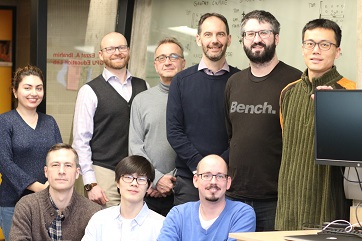Researchers will be actively testing machine learning models in the field this spring thanks to the latest innovation of theTerraByteproject led by The University of Winnipeg’s Dr. Christopher Bidinosti, Department of Physics, and Dr. Christopher Henry, Department of Applied Computer Science.
This demonstrates what the future might hold for robotics and autonomous vehicles in agriculture.
Dr. Christopher Bidinosti
Along with postdoctoral scholar Dr. Michael Beck, they recently partnered with R-Tech Industries to design and build thedata rover, a lightweight, solar-powered, remote-operated machine that will travel across soybean plots on fat bike tires to collect large volumes of crop data in the form of digital images as well as data from other sensors for hyperspectral and 3D imaging.
Bidinosti was thrilled by how quickly the team at R-Tech Industries brought the UWinnipeg vision to life.
“We brought some ideas to them and within months they had it built, which is really quite remarkable,” said Bidinosti. “This demonstrates what the future might hold for robotics and autonomous vehicles in agriculture.”
R-Tech Industries specializes in custom agricultural research equipment, working with researchers to create innovative machinery.
“We listened to Chris and his team to understand what the goals of the project were, drawing on our experience to make suggestions toward the final design,” said Rob McClement, owner of R-Tech Industries. “As this was a unique project and somewhat outside of our scope of expertise, we collaborated with Shea Hunt at Valley Prototyping Solutions to design the drive systems. R-Tech General Manager Liam Riddell designed the frame and mechanical systems and integrated Shea’s work into the completed project.”
Daryl Domitruk, Executive Director at Manitoba Pulse and Soybean Growers (MPSG), connected Bidinosti and Henry with R-Tech Industries.
Domitruk provides the research team with vital insights into Manitoba’s agriculture sector, and has introduced them to local farmers whose fields have been used for data collection.
“Digital farming applications such as artificial intelligence and machine learning are potentially game changing,” he said. “However, there needs to be experience-based knowledge transfer and a lot of peer-to-peer learning among farmers before they can wholly embrace this potential. This is complicated stuff. UWinnipeg researchers are providing us with an opportunity to understand this technology in an objective manner. Our role is to explain it to farmers and remove some of the mystery. This is key to farmers eventually adopting these technologies.”
Digital agriculture helps farmers grow more resilient crops
The Rover is the realization of Bidinosti and Henry’s shared vision of creating a high-quality, labelled image database that is accessible to industry and academy.
Now that the Rover is built, the research team will continue its work with MPSG and NorthStar Robotics to develop software and conduct field testing during the 2022 growing season, supported by anAg Action Manitobagrant via the Canadian Agricultural Partnership, as well as a Mitacs Accelerate Grant with MPSG as the industry partner.
To realize this vision, Henry and Bidinosti have spent many hours building relationships and cultivating partnerships. These interdisciplinary connections have been vital to the project’s continued success.
“We have the data collection and machine learning sensor expertise. R-tech builds specialized farming equipment. MPSG gives us insight into the range of crop production problems that machine learning can solve. NorthStar Robotics specializes in autonomous control of vehicles which will let us test machine learning models in the field, and collect more data,” said Henry.
UWinnipeg alum Alex Krosney is a member of the TerraByte research team. He is currently working with NorthStar Robotics on the interface between the Rover’s Jetson (brain) and its microcontroller.
“The Jetson sends commands to a microcontroller and communicates to the rover’s motors so it can move autonomously. From an anatomy perspective, this may be analogous to a nervous system of sorts. Once we have the bridge between the Jetson and the microcontroller complete, I’ll move more into the ‘brain’ side of things,” said Krosney.
This technology will eventually allow farmers to care for individual plants in commercial fields in the same way we care for plants in backyard gardens.
“Of course, this is a massive task and requires a significant level of automation,” said Krosney. “The rover will be used to collect large numbers of plant images in an outdoor setting. These images will later be used for training neural networks to perform machine learning tasks such as plant detection, species classification, health ratings, and more.”
Collaboration key to project success
当他们在2019年首次公布他们的研究,the vision of automatically generating and labeling images through a computer-controlled camera system was theoretical. By collaborating with industry partners with diverse resources and expertise, Bidinosti and Henry are able to push the boundaries of what’s possible in digital agriculture.
“This will improve crop breeding, crop disease research, and organic farming practices to ultimately provide farmers with more resilient, drought-resistant crops,” said Bidinosti.
In 2019, UWinnipeg, in partnership with EMILI, received$2.4 million from Western Economic Diversificationand$250,000 from a Weston Seeding Food Innovation Grant. Since then, they’ve received significant funding from Mitacs and they continue to grow TerraByte with industry and academic partnerships across the country.
“It takes all of us working together to realize this vision,” said Henry.





